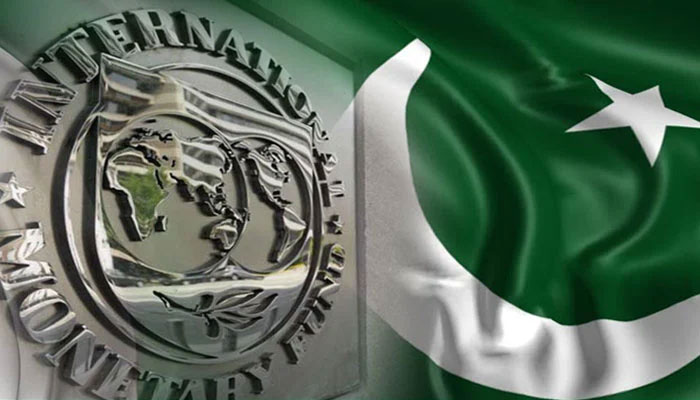IMF projects Pakistan’s external financing needs at $23.6bln for FY22
ISLAMABAD: The International Monetary Fund (IMF) estimated Pakistan’s gross external financing requirements at $23.6 billion for the next fiscal year of 2021/22 and that is down compared to an estimated $27 billion for the outgoing fiscal year.
In a staff report on Thursday, the IMF further projected the available external financing at $24.9 billion for the upcoming fiscal year. Pakistani authorities have remained engaged with external creditors to secure financing to meet the extended fund facility (EFF) program’s debt sustainability objectives.
China has maintained its exposure by renewing (and augmenting) the CYN 30 billion (about $4.6 billion) three-year bilateral currency swap (about $3 billion at the time of EFF approval), as well as by renewing the maturing commercial loans as part of the program financing assurance commitment. China has also provided an additional $1bn deposit in July 2020, raising the state administration of foreign exchange (SAFE) deposits to $4 billion. Good prospects for financing remain for the remainder of the program, according to the IMF. Moreover, the G20 debt service suspension initiative amounting to about $2.5 billion (0.9 percent of FY 2021 GDP) has helped reduce gross financing needs in the near term.
The IMF data shows that Pakistan gross external financing requirements would be standing 8 percent of gross domestic product (GDP) for the next financial year. The current account deficit will be hovering around $5.419 billion for the next fiscal year against $4.1 billion for the outgoing fiscal year. The amortisation of loans would consume $17.1 billion in the next fiscal year both for the public and private sector against $21.8 billion for the outgoing fiscal year.
According to the IMF’s staff appraisal, the program remains fully financed. Financing commitments from bi- and multilateral partners and the temporary suspension of debt service to official bilateral creditors granted under the G20 DSSI initiative will cover gross external financing needs amounting to $27 billion (9.9 percent of GDP) over the next twelve months. While key bilateral creditors have maintained their exposure to Pakistan, there has been a rebalancing between creditors in recent months. In this regard, the staff encourages all key bilateral creditors to maintain their exposure to Pakistan in line with program commitments. Pakistan’s capacity to repay the IMF is adequate, but risks remain high. The IMF’s exposure reaches SDR5.3 billion (or 265 percent of quota and about 60 percent of gross reserves) with this review. With full purchases, it will peak at 344 percent of quota in 2022. As assessed before, elevated risks—notably from delayed adoptions of reforms, high public debt and gross financing needs, and low reserves—could jeopardize program objectives, and erode repayment capacity and debt sustainability. Uncertainty about global economic and financial conditions amid the Covid-19 pandemic adds to those risks. The reinforced framework for program monitoring (including continued quarterly reviews and updated program conditionality), focused technical assistance in support of program implementation, and adequate execution of existing financing commitments are essential mitigation strategies.
-
 Kylie Jenner Reveals Real Story Behind Her 'The Moment' Casting
Kylie Jenner Reveals Real Story Behind Her 'The Moment' Casting -
 Halsey Marks Fiancé Avan Jogia's Birthday With Emotional Note
Halsey Marks Fiancé Avan Jogia's Birthday With Emotional Note -
 China: Stunning Drone Show Lights Up Night Sky Ahead Of Spring Festival 2026
China: Stunning Drone Show Lights Up Night Sky Ahead Of Spring Festival 2026 -
 Andrew's Epstein Scandal: Will King Charles Abdicate Following King Edward's Footsteps?
Andrew's Epstein Scandal: Will King Charles Abdicate Following King Edward's Footsteps? -
 Billy Joel Leaves Loved Ones Worried With His 'dangerous' Comeback
Billy Joel Leaves Loved Ones Worried With His 'dangerous' Comeback -
 Prince William Dodges Humiliating Question In Saudi Arabia
Prince William Dodges Humiliating Question In Saudi Arabia -
 Dax Shepard Describes 'peaceful' Feeling During Near-fatal Crash
Dax Shepard Describes 'peaceful' Feeling During Near-fatal Crash -
 Steve Martin Says THIS Film Has His Most Funny Scene
Steve Martin Says THIS Film Has His Most Funny Scene -
 Kensington Palace Shares Update As Prince William Continues Saudi Arabia Visit
Kensington Palace Shares Update As Prince William Continues Saudi Arabia Visit -
 Fugitive Crypto Scammer Jailed For 20 Years In $73m Global Fraud
Fugitive Crypto Scammer Jailed For 20 Years In $73m Global Fraud -
 Will Andrew Mountbatten-Windsor Finally Go To Jail Now That King Charles Has Spoken Out? Expert Answers
Will Andrew Mountbatten-Windsor Finally Go To Jail Now That King Charles Has Spoken Out? Expert Answers -
 Melissa McCarthy Reveals Her Tried And Tested ‘corpse’ Night Time Routine That’s Lost Her 95lbs
Melissa McCarthy Reveals Her Tried And Tested ‘corpse’ Night Time Routine That’s Lost Her 95lbs -
 Horrifying Pictures Of The Kidnapper Of Savannah Guthrie's Mother Released
Horrifying Pictures Of The Kidnapper Of Savannah Guthrie's Mother Released -
 Andrew's Ex-girlfriend Launches Brazen Attack On Epstein Victims On Piers Morgan Show
Andrew's Ex-girlfriend Launches Brazen Attack On Epstein Victims On Piers Morgan Show -
 Andrew Mountbatten-Windsor 'on His Own' As Palace Gives Green Light To Law Enforcement
Andrew Mountbatten-Windsor 'on His Own' As Palace Gives Green Light To Law Enforcement -
 Kanye West's Tweet About Super Bowl Halftime Resurfaced After Bad Bunny's Show
Kanye West's Tweet About Super Bowl Halftime Resurfaced After Bad Bunny's Show




